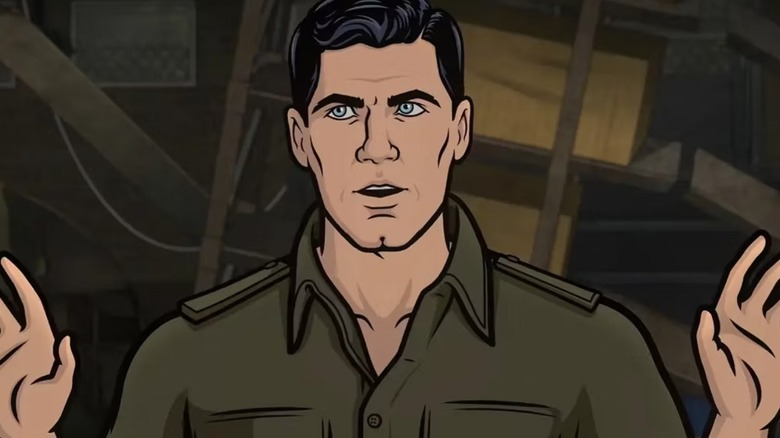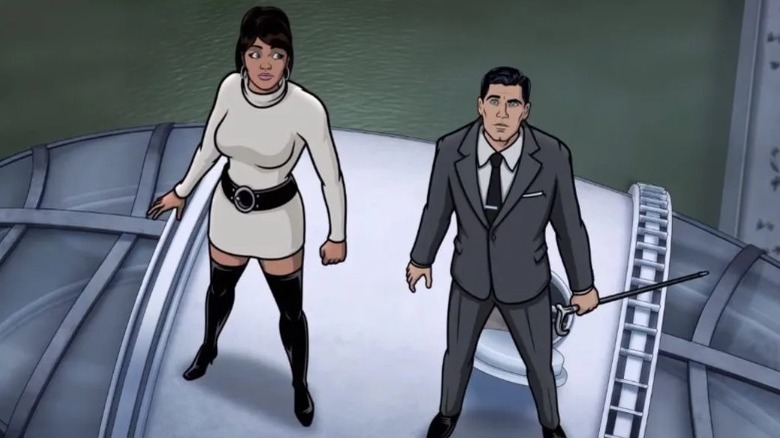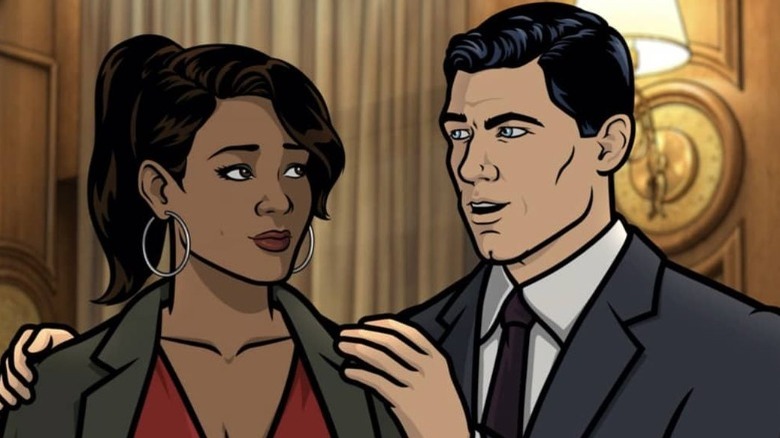How H. Jon Benjamin Handles Archer's Constant Genre Hopping
Adam Reed's animated sitcom, "Archer," has undergone massive tonal shifts and genre changes over the course of its 13-season run. Reed initially conceived "Archer" as a genre parody of spy thrillers that featured overt satire and quick-witted humor. The first few seasons of the show were glorious, following the shenanigans of Sterling Archer (voiced by H. Jon Benjamin) and his dysfunctional, mostly incompetent colleagues who are part of an intelligence agency. Season 10 was almost the end of "Archer" when the show creators changed its structural formula — while some of it worked, and most of it missed the mark, a shift to self-contained anthologies marked an interesting turn for the animated dramedy.
"Archer" revolves around the titular protagonist, who is supposed to parody a stereotypical James Bond-like figure: Sterling is exceptionally self-centered, a raging alcoholic, emotionally unavailable, and not very good at his job. Benjamin makes brilliant work of highlighting the character's self-conscious portrayal of what he is meant to represent, and the supporting intelligence agents (who are wonderfully disastrous in their own ways) help maintain a consistent tone of hilarity and intrigue. Halfway through the series' run, "Archer" discarded its spy aspects and delved deeper into the protagonist's psyche, culminating in the reveal that Archer was in a coma. This allowed the show to branch into self-contained anthologies that gave way to new character dynamics, as the writers threw in the "alternate-universe" trope for good measure.
H. Jon Benjamin, whose character is at the center of this controlled chaos, has to constantly adapt to the shifting tones of the show, as every season after the ninth installment called for a complete reinvention. How does he manage to handle these relentless changes?
Archer thrives on unpredictability
In anticipation of the "Archer" season 13 premiere, H. Jon Benjamin spoke to Screen Rant about his initial reaction to the latest season's scripts and how it feels to not show an arc ahead of time. Benjamin explained that scripts are generally given out once a month, and as the show is always in production, the overarching quality of a season is only fully-realized by the time everything is wrapped up. He also said that the first scripts for the later seasons were distributed right in the midst of production, as opposed to him being briefed about character arcs and developments before production commenced:
"They used to give me a call at the beginning of the season and sort of fill me in on the season arc, or what Archer's up to or what everybody's doing, especially during the coma seasons. Maybe that started around season 5, with Archer Vice when they did more thematic stuff, but now, they just stop calling. They don't really tell me anything ... you just get handed the first scripts, and then it's off to the races."
The fact that Benjamin and the rest of the voice cast now work with scripts without prior knowledge of their overall season arcs works well with the altered format of the show, which delves into fresh, spontaneous character deviations, allowing for increased creative freedom. As opposed to the mission-related narratives that defined the first few seasons of the show, the alternate timeline anthologies allow the characters to navigate unchartered territories, whilst retaining their core personalities (except that one time when Cyril was a Nazi and Dr. Krieger wasn't even human).
Despite tonal shifts, Sterling Archer will never change
When asked about his preference between having prior knowledge about the script and working with a more last-minute, hands-on approach to his character, H. Jon Benjamin explained that it doesn't matter, as the characters always stay true to themselves. No matter how hilariously chaotic things get, Sterling Archer will always drink on the job while messing up classified, high-priority missions, and his dynamic with his team always remains thematically consistent. Even when the show dives into Archer's psyche and takes on a more surreal approach, Benjamin is asked to "pretty much stay the same" and "be the a**hole that Archer is," which lends authenticity to the character, no matter the changes.
This, however, does not mean that "Archer" is a one-note experience that heavily relies on pre-established dynamics — the showrunners are not afraid to up the ante in terms of the show's meta-humor and biting sarcasm. This sets "Archer" apart from its genre counterparts, as it provides viewers with multidimensional characters who grow as the seasons progress, while grounding each of them with familiar traits that help retain the essence of who they are as people. Moreover, in season 13, the group spirals out of control more than usual in the aftermath of Jessica Walter's tragic absence, who voiced their boss and mentor, Malory Archer. This allows space for emotional depth and nuance amidst the show's telltale humor.
While it's unclear how many more seasons of "Archer" we are going to be blessed with, the show's genre-hopping and shifting tone prevents the subject matter from becoming stale. No matter what happens, we can always rely on Sterling Archer and his colleagues to monumentally mess up a high-stakes case or do something stupid enough to incite more chaos.


